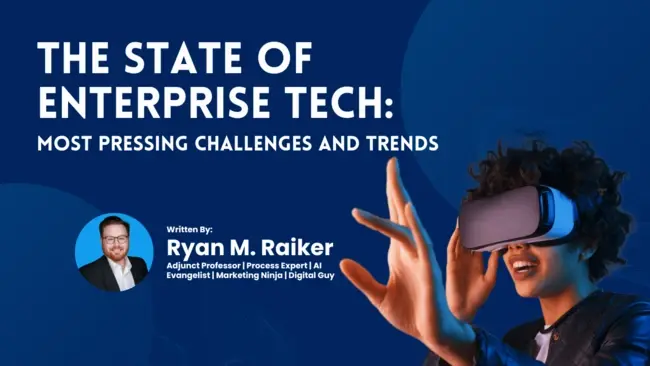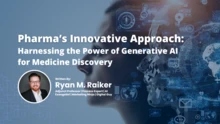
The technology field is always rapidly evolving. As a result, automation experts and executives need to stay on top of the latest trends and challenges in order to remain competitive. From cloud computing to artificial intelligence (AI), here are some of the most pressing challenges and trends in enterprise technology that you should be aware of.
The Human Element
Enterprise automation isn’t just about replacing manual tasks with automated ones—it’s also about making sure that the human element is taken into account. Automation should never mean eliminating humans from the process entirely; it should always be used to enhance rather than replace human effort. This means finding ways to make sure that employees are kept informed of changes in the automation process and given opportunities to offer feedback on how it could be improved or adapted for their specific needs. It also means understanding how automation technologies interact with human behavior and making sure that any automated system takes this into account when it makes decisions or takes actions.
The Role of Artificial Intelligence
Another major challenge facing enterprise tech today is how to best use artificial intelligence (AI) within an automation system. AI can help automate routine tasks without sacrificing quality or accuracy by leveraging machine learning algorithms to identify patterns in data, predict customer behavior, and automate decision-making processes. However, AI can also introduce ethical considerations from both a data privacy perspective as well as from a risk management perspective. Businesses must ensure that any AI system they use adheres to industry regulations and ethical guidelines so that decisions made by the system are fair for all involved parties.
The Combination of AI and Machine Learning
Artificial Intelligence (AI) and machine learning are two areas of tech that are becoming increasingly popular among organizations looking to optimize their operations. AI can help automate mundane tasks, while machine learning can help make more informed decisions based on data analysis. However, there is still a lot of work to be done when it comes to ensuring that these technologies are used responsibly, ethically, and securely. Companies need to invest time and resources into understanding how these technologies work before they start implementing them into their systems.
Data Security & Privacy Challenges
With the rise of large-scale data breaches, cybersecurity is one of the top concerns for organizations across all industries. As such, companies need to ensure they have robust security measures in place to protect their data, systems, and networks from threats like malware, hackers, and phishing attempts. This includes using technologies like firewalls, anti-malware software, and encryption solutions, as well as instituting best practices such as multi-factor authentication, regular security awareness training programs, and regular audits of existing systems/networks, etc.
The more automated systems rely upon sensitive customer information (such as personal information or financial records), the greater risk there is of a breach or other malicious attack on the system itself or the customer’s data stored within it. As organizations store customers' personal information online, they must ensure that this data is kept safe from malicious actors who may try to exploit it for financial gain or other nefarious purposes. Companies need to invest in robust security protocols and policies that protect customer data while also adhering to industry regulations such as GDPR or CCPA. To mitigate these risks, businesses must ensure they have robust cybersecurity measures in place across all aspects of their operations—from network infrastructure to employee training—and regularly audit these systems for any vulnerabilities or weak points that could be exploited by malicious actors looking to gain access to sensitive information.
Cloud Computing
Cloud computing is one of the most important trends in enterprise tech, as it offers organizations a way to store their data and applications without relying on physical hardware. Cloud-based solutions are becoming increasingly popular among businesses due to their ability to provide flexible storage capabilities without requiring any physical hardware onsite or extensive maintenance costs. With this shift to cloud computing come both advantages (ease of use, scalability) and new challenges (security risks, privacy compliance). Companies need to consider all aspects when determining which cloud-based solution is best for their specific needs. Cloud computing also allows companies to scale up or down depending on their needs, without having to invest in additional hardware or software licenses. The challenge for companies lies in making sure their cloud-based environments are secure and reliable, as well as cost-effective.
Automation Everywhere
Automation has already made its way into many different areas, such as marketing campaigns or IT infrastructure management tasks, etc. However, adoption is still relatively low overall due primarily to cost constraints or lack of knowledge around how exactly automation works in practice, amongst other reasons. As automation develops further, though, we should expect it to become increasingly commonplace across all sectors – providing enhanced efficiency potential with reduced manual labor costs associated with complex processes that would otherwise require skilled human labor forces!
The world of enterprise technology is constantly changing, so staying ahead of the curve is critical if you want your business to remain competitive in today's digital landscape. By understanding the latest trends and challenges facing enterprise tech today—from cloud computing and AI/machine learning solutions to data security concerns—you will be able to prepare your organization for long-term success better.
About the Author
Ryan Raiker is an experienced and certified marketing professional. He serves as a start-up advisor, marketing leader, and adjunct professor in the fields of business management, communications, and digital media informatics at Widener University in Chester, Pennsylvania.
Ryan actively writes in multiple publications on Medium and with other publishers. You can learn more about him at RyanRaiker.com.












